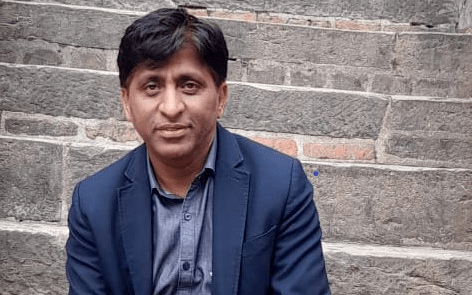
Woman cotton worker in Meho Machi village of Matiari district in Sindh, Pakistan. Via Javed Hussain. Used wth permission.
Pakistan is the 5th largest cotton producer in the world and the two provinces of Punjab and Sindh account for 99 percent of Pakistan’s cotton production. Over half a million women work as cotton pickers in the Sindh province of Pakistan alone. However, as a result of limited literacy and numeracy skills, women frequently face exploitation and are particularly underpaid by cotton farmers.
Javed Hussain, an environmentalist from Pakistan, achieved an outstanding feat in November 2022 when he received the prestigious ‘Gender Just Climate Solution Award’ at the Climate Conference COP27 in Egypt for his project titled ‘Advancing the labor rights of women cotton pickers in Pakistan.’ As a Project Lead at the non-profit Sindh Community Foundation (SCF), Hussain has been working tirelessly for years to secure the rights of women cotton pickers, who face the dual challenges of extreme weather events and rising temperatures.
Global Voices interviewed Javed Hussain via email about his work to improve the literacy skills and rights of women cotton pickers in Pakistan. The interview has been edited for brevity and clarity.
Global Voices (GV): You are the first Pakistani environmentalist to win the ‘Gender Just Climate Solution Award’. Tell us about your journey to global recognition.
Javed Husain (JH): The award was given in recognition of strengthening climate adaptation measures. This included establishing a training programme for women agricultural workers on climate awareness, climate justice and labor rights protection. Out of 259 organizations representing 119 countries, including Pakistan, that submitted their applications for the awards, only three were selected for recognition by The Women and Gender Constituency, UNCTCN, and Women Engage for a Common Future.
GV: Tell us about your projects with women cotton pickers in Pakistan.
JH: The Sindh Community Foundation (SCF) is dedicated to protecting and improving the working conditions of women cotton workers in the Matiari District, a significant cotton-producing region in the Sindh province of Pakistan. The project is aimed at improving literacy skills, raise awareness of rights, and foster networking opportunities for women engaged in cotton picking, enabling them to secure fairer wages and safer working conditions. Supported by international development charity Feed the Minds, the project is being executed in ten villages located within the district.
GV: How does SCF work towards achieving climate justice for women agriculture workers?
JH: Approximately 1.5 million smallholder farmers rely on cotton cultivation as their primary source of livelihood. Cotton, which covers 15 percent of the country's cultivated land, is the most extensively grown crop. The burden of the cotton industry largely falls on women, with over half a million women engaging in cotton picking in Sindh and 50,000, specifically in Matiari. Despite their contributions, they remain poor and exploited. Their health also suffers from the hazardous working environment that involves excessive use of poisonous pesticides. Furthermore, the adverse effects of rising temperatures, reaching up to 49 degrees Celsius, have severely impacted their health, labor productivity, and overall livelihoods. Occupational health and safety are poor for these workers.
The recent floods had an adverse impact on the population of Sindh, affecting approximately 12 million people. These people had limited adaptation skills and climate literacy to effectively tackle the climate crisis. To address these issues, the Sindh Community Foundation (SCF) has taken proactive measures in creating climate change awareness skills in five villages within the Matiari district. Through these efforts, SCF has directly and indirectly reached out to 359 women cotton workers residing in these villages. After the training, SCF found that the women cotton workers had increased confidence, adaptation skills, safer working conditions and participation in climate change adaptation processes.
GV: Could you please shed some light on how SCF uses a feminist participatory action research approach in its project implementation?
JH: The Sindh Community Foundation (SCF) uses a Feminist Participatory Action Research (FPAR) approach to support the demands of women agriculture workers — particularly cotton pickers — to advocate for improved working conditions and health services in response to rising temperatures. Located in the Matiari District of Pakistan, the Foundation developed an innovative advocacy strategy linking social and climate justice, aiming to enhance climate adaptation measures. A key objective is to establish a training programme for 100 women agricultural workers, equipping them with knowledge on climate awareness, climate justice, and labor rights protection. Ultimately, SCF strives to influence policymakers to implement the Sindh Agriculture Women’s Protection Act of 2020.
SCF conducted training sessions to empower women leaders with the feminist participatory action research approach. These sessions included engaging in focus group discussions with women cotton pickers. At the advocacy level, we had interacted with policy makers to promote climate safety and improve working conditions, occupational health and safety protection and health protection and insurance for workers. As a result, the Sindh Government passed a law called Sindh Women Agriculture Workers Protect Act 2020. Despite some delays in the implementation of this act, with a collective voice, we could achieve a change in a policy.
GV: What are your future plans in terms of strengthening climate adaptation measures in Pakistan?
JH: We are devoted to improving the climate resilience of female cotton workers and boosting their knowledge and adaptation skills in Sindh.
Our initiative aims to empower a significant number of women, approximately 30,000 individuals benefiting from literacy skills through the establishment of 600 literacy centers. Besides basic literacy, these centers will improve climate literacy, awareness of occupational health and safety, and promote decent work environment and off-season poverty reduction programmes. Similarly, our focus also remains in initiating women led climate justice campaign, gender transformation, climate justice and resilience and labor rights protection of women cotton workers. The other important part is advocacy for implementation of laws and policy commitments and social safety nets and aligning with the Nationally Determined Contributions (NDCs).







